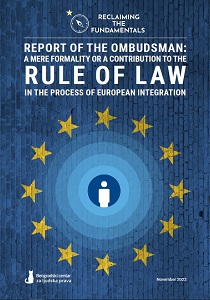REPORT OF THE OMBUDSMAN: A MERE FORMALITY OR A CONTRIBUTION TO THE RULE OF LAW IN THE PROCESS OF EUROPEAN INTEGRATION
REPORT OF THE OMBUDSMAN: A MERE FORMALITY OR A CONTRIBUTION TO THE RULE OF LAW IN THE PROCESS OF EUROPEAN INTEGRATION
Author(s): Lena Petrović
Subject(s): Politics / Political Sciences, Politics, Law, Constitution, Jurisprudence, Constitutional Law, Human Rights and Humanitarian Law, Government/Political systems, EU-Approach / EU-Accession / EU-Development
Published by: BCBP Beogradski centar za bezbednosnu politiku
Summary/Abstract: In this document, the position of the Ombudsman (Protector of Citizens) will be discussed from the point of view of the attitude of the National Assembly and the Government of the Republic of Serbia toward the Ombudsman’s regular annual reports. In the past ten years, Serbia has largely regressed in terms of democracy and the rule of law. Data from international and domestic organisations point to a state that has been captured by one party, the collapse of the separation of powers, and the absence of political dialogue. On the other hand, the Government of Serbia keeps emphasising the rule of law as its main priority in the accession negotiations with the European Union (EU). For the EU, the development of democratic processes is the main aspect of Serbia’s approach. In such circumstances, the attitude of the legislative and executive powers towards the report of the Ombudsman shows whether the authorities are essentially or just formally committed to the rule of law and admission to the European Union. The Ombudsman is an independent state body that protects the rights of citizens and controls the legality of the work of the administration. Its role is protected by the Constitution of the Republic of Serbia. The Global Alliance for National Human Rights Institutions (GANHRI) gave it the highest status A, which shows that its work is in line with international standards. However, analyses reveal certain weaknesses of this independent institution. The reports on Serbia’s progress in the process of accession to the European Union for 2021 and 2022 highlighted the need to strengthen the Ombudsman by providing staffing and financial resources and ensuring systematic cooperation with the authorities. Although there are numerous challenges in the work of the Ombudsman, this document analyses only the practice of its reporting to the National Assembly, in the context of ongoing reforms implemented for the purpose of Serbia’s accession to the European Union. We particularly stress the importance of the Ombudsman in strengthening democratic institutions and fulfilling the criteria from the negotiation Chapters 23 (Judiciary and Fundamental Rights) and 24 (Justice, Freedom and Security), and propose solutions that contribute to political responsibility and the rule of law.
Series: Beogradski Centar za Bezbednosnu Politiku - POLICY PAPERS
- Page Count: 13
- Publication Year: 2022
- Language: English
- Content File-PDF

